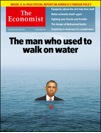What is diplomacy or, more relevant, what is it like to be a diplomat? The question is important and lies at the heart of my discussion earlier in the summer with Katharina Hone about the plethora of new diplomacies. My...
KEEP READINGThe CPD Blog is intended to stimulate dialog among scholars and practitioners from around the world in the public diplomacy sphere. The opinions represented here are the authors' own and do not necessarily reflect CPD's views. For blogger guidelines, click here.

The Global Five: Key Corporate Diplomacy Trends for 2014/2015
"The state of the American brand is abysmal, the U.S. Government is broadly seen as passive, reactive and ineffectual, and the private sector has been so preoccupied with the compounding economic crises that collective, strategic corporate diplomacy and global engagement efforts seem to have stagnated or fallen off completely."
Each year I reflect on the past year’s efforts and look ahead to distill emerging trends and opportunities for the private sector to engage in impactful corporate diplomacy efforts. When I look at the corporate diplomacy landscape today and how it has evolved over the past several years I feel a deep sense of déjà vu. Ten years ago I helped launch Business for Diplomatic Action (BDA) which at the time was the only private-sector led public diplomacy effort. Keith Reinhard and our founding corporate board members began BDA at the time because we saw the world moving away from America and the American brand was in a state of disrepair. We felt that companies were uniquely positioned to engage in public diplomacy efforts in new and impactful ways, free from the political baggage that was hindering the U.S. Government, to help build bridges of respect and understanding for America with the world. BDA engaged numerous companies over our eight year tenure and launched a series of important initiatives and public-private partnerships, one of which the groundbreaking New Beginnings to promote entrepreneurship globally between the Entrepreneurs Organization and the U.S. Department of State continues to this day. When we retired BDA in the fall of 2012 there was much moving forward in the corporate diplomacy space and the America brand was doing relatively well. Fast forward to today and in many respects American soft power seems to be back where it was a decade ago. The state of the American brand is abysmal, the U.S. Government is broadly seen as passive, reactive and ineffectual, and the private sector has been so preoccupied with the compounding economic crises that collective, strategic corporate diplomacy and global engagement efforts seem to have stagnated or fallen off completely.
Why We Need to Enlist an Army of Corporate Diplomats….Now
American soft power is cyclical in nature and it is precisely at times like these – when we are entering a new Presidential political season and then transition throughout government with a new slate of appointees and staffs – that the private sector should come together in a serious way and engage in strategic corporate diplomacy efforts. We need a new call to action for the private sector to step up and take the lead in public diplomacy efforts.



The Case for Greater Private Sector Global Engagement
- Business remains significantly more trusted than the Government
- Business has greater resources and flexibility, able to act quickly on a global scale irrespective of political agendas
- Business has the largest stockpile of engagement and influencing tools at their disposal with a vast reservoir of people who are experts in executing these tools and measuring their impact
The Global Five Key Corporate Diplomacy Trends for 2014/2015
The business sectors that garner the greatest influence in developed and emerging markets are Technology, Automotive, Food & Beverage and Consumer Packaged Goods. Ideally, they would be the ones to lead the charge for any major collective corporate diplomacy. The following are key areas where I see the private sector most likely to engage in corporate diplomacy activities over the coming years.
- Tri-Sector Engagement & Triple Strength Leadership -- Tri-sector engagement, the bringing together of the public, private and NGO
 communities, to work together on joint corporate diplomacy efforts will remain an emerging trend in 2014 and beyond. Not only does this approach pull from the strengths of each sector, but it also helps create efforts and initiatives that will serve the collective interest and thereby have deeper impact long-term. A tri-sector approach takes time though and requires the cultivating and active nurturing of numerous, diverse relationship webs on the ground, an area in which the private sector excels. More and more companies as well as governments are now emphasizing Triple Strength Leadership which builds off the notion of tri-sector engagement as skillsets and experience in all three sectors is now increasingly valued and respected. You are only going to see more in this space.
communities, to work together on joint corporate diplomacy efforts will remain an emerging trend in 2014 and beyond. Not only does this approach pull from the strengths of each sector, but it also helps create efforts and initiatives that will serve the collective interest and thereby have deeper impact long-term. A tri-sector approach takes time though and requires the cultivating and active nurturing of numerous, diverse relationship webs on the ground, an area in which the private sector excels. More and more companies as well as governments are now emphasizing Triple Strength Leadership which builds off the notion of tri-sector engagement as skillsets and experience in all three sectors is now increasingly valued and respected. You are only going to see more in this space.
- Mitigating & Managing Geopolitical Risk – over the past year or so as the economic crises have settled, more companies are increasingly concerned with how to manage, mitigate, and respond to geopolitical risks and shifts. This is an area where governments and the private sector have much to gain and learn from one another if they come together. I see more and more companies willing to engage in this space with governments.
- Shift from Focusing Solely on Women’s Leadership to Gender Intelligence – Around the world governments and companies are trying to
 get women’s leadership right. Millions have been spent and will continue to be spent ‘empowering women and girls’ and yet the impact of these efforts has not been what many had hoped for and in some cases we seem to be going backwards not forwards, particularly here in the west. Enter the notion of Gender Intelligence and a shift in how the thinking in this space has evolved. If you have any interest in this subject you need to read Gender Intelligence which just came out this month by Barbara Annis who has pioneered the research and work in this area.
get women’s leadership right. Millions have been spent and will continue to be spent ‘empowering women and girls’ and yet the impact of these efforts has not been what many had hoped for and in some cases we seem to be going backwards not forwards, particularly here in the west. Enter the notion of Gender Intelligence and a shift in how the thinking in this space has evolved. If you have any interest in this subject you need to read Gender Intelligence which just came out this month by Barbara Annis who has pioneered the research and work in this area.
- MBAs Learning Corporate Diplomacy & Emotional Intelligence – I began developing and teaching a Corporate Diplomacy course for USC’s Master of Public Diplomacy (MPD) program in 2010. At the time USC was way ahead of the curve as few if any graduate schools in the U.S. had similar programs. Today, you have several MBA schools like Wharton, Harvard, and Hult International Business School offering courses in this space as well as placing importance on the development of ‘soft skills’ in their MBA cohorts. You are going to see more business schools and companies exploring and developing corporate diplomacy training programs that accelerate the development of discrete global engagement skillsets – particularly in the emotional intelligence, crisis communications, global leadership and strategic influence areas.
- Re-Thinking & Reviving World Citizenship -- Engaging, Preparing & Inspiring The Next Generation of Global Leaders – One of BDA’s most
 successful efforts was the World Citizens Guide which we produced in 2003 in response to the global research we conducted asking people in over 100 countries, “If you could advise Americans on how they could be better global citizens, what would you tell them?” What came from all the rich insights we gleaned was a passport sized book for Americans due to study abroad. The World Citizens Guide quickly took on a life of its own and we developed subsequent versions for business leaders, the travel industry and a robust award-winning website to share further resources on global citizenship. At the heart of this entire movement was the notion that we would connect and prepare the next generation of Americans to be globally minded, globally aware, and globally engaged; that America’s global engagement began at home. What we didn’t anticipate was the response from Americans of all ages who wanted to learn more about the world and find ways to engage globally as well as develop global skillsets. The World Citizens Guide effort continues to this day and several new aspects of the effort will be announced later this year. In the meantime, there
successful efforts was the World Citizens Guide which we produced in 2003 in response to the global research we conducted asking people in over 100 countries, “If you could advise Americans on how they could be better global citizens, what would you tell them?” What came from all the rich insights we gleaned was a passport sized book for Americans due to study abroad. The World Citizens Guide quickly took on a life of its own and we developed subsequent versions for business leaders, the travel industry and a robust award-winning website to share further resources on global citizenship. At the heart of this entire movement was the notion that we would connect and prepare the next generation of Americans to be globally minded, globally aware, and globally engaged; that America’s global engagement began at home. What we didn’t anticipate was the response from Americans of all ages who wanted to learn more about the world and find ways to engage globally as well as develop global skillsets. The World Citizens Guide effort continues to this day and several new aspects of the effort will be announced later this year. In the meantime, there  are numerous other programs and thought leaders in this space that are worth watching, from The Global Mindset Institute at Thunderbird to Mark Gerzon who leads the Mediators Foundation and has written an excellent book called American Citizen, Global Citizen: How Expanding Our Identities Makes Us Safer, Stronger, Wiser – And Builds a Better World.
are numerous other programs and thought leaders in this space that are worth watching, from The Global Mindset Institute at Thunderbird to Mark Gerzon who leads the Mediators Foundation and has written an excellent book called American Citizen, Global Citizen: How Expanding Our Identities Makes Us Safer, Stronger, Wiser – And Builds a Better World.
"We need an army of corporate diplomats, from multiple sectors, engaged in strategiccorporate diplomacy efforts to shore up America’s soft power reserves."
Bottom Line: the next generation needs both global skillsets and experiences and to cultivate a global mindset to be able to compete and succeed. We owe it to future generations to educate and empower them to succeed in the global market and it begins with global citizenship efforts.
We need an army of corporate diplomats, from multiple sectors, engaged in strategic corporate diplomacy efforts to shore up America’s soft power reserves. As I’ve written in past blogs, if we are ever to achieve a balance between public and private power and long-term impact for public and private sector led public diplomacy efforts, we will need private sector leadership to collectively and openly come together, recognize the critical role of corporate diplomacy and tri-sector engagement, and begin enlisting and training an army of current and future corporate diplomats. Starting Now.
Visit CPD's Online Library
Explore CPD's vast online database featuring the latest books, articles, speeches and information on international organizations dedicated to public diplomacy.
POPULAR ARTICLES
-
January 29
-
January 20
-
January 28
-
January 2
-
January 8
Join the Conversation
Interested in contributing to the CPD Blog? We welcome your posts. Read our guidelines and find out how you can submit blogs and photo essays >.













